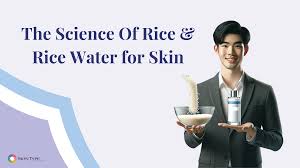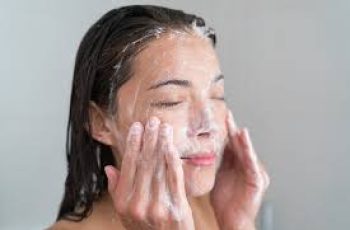
The Science of Rice and Rice Water for Skin
Rice, one of the most common food staples in the world, has more that just calories in its quiver. Rice and its byproducts, particularly rice water, have carved a niche in skin care regimens worldwide. This blog unravels and simplifies the science of rice and rice water for skin. I will be referring to the Baumann Skin Types throughout this blog, so if you haven’t already found your skin type, you can take the quiz by clicking the button below!
What is Rice used in Skin Care?
Rice (Oryza Sativa) in skin care most commonly refers to the pressed oil of rice, or extracts/powders made of the hard outside of un-milled rice. Whole grains of unprocessed rice are, to my knowledge, not used in skin care. The two most common ways for rice to appear in skin care products is as the pressed oil as mentioned, or as rice water.
If you’re just here for product recommendations, these are some of my favorite products with rice (Oryza Sativa) in skin care:
(Otherwise, keep reading to learn the science of rice)
What is Rice Water?
Rice water is the cloudy liquid remaining after rice is washed or cooked. Through this cooking, the water is imbued with many of rice’s beneficial components. This traditional remedy, steeped in history, is famous for its soothing, brightening, and anti-aging properties. The method of obtaining rice water—whether through soaking, boiling, or fermenting—alters its nutrient profile, offering a versatile ingredient for various skin care solutions.
Benefits of Rice for Skin
From the compounds listed below, rice and rice water’s potential skin benefits are broad. The compounds in rice provide antioxidants for protection, amino acids for repair, and minerals for health, addressing issues from dryness and irritation to aging and uneven skin tone.
What is Rice Made of?
Rice, particularly its bran and hull, is rich in phenolic compounds, lipids, vitamins, and minerals. Here are some of the key compounds found in rice:
Ferulic Acid : Ferulic acid is potent antioxidant that helps to neutralize free radicals, reduce the effects of harmful UV radiation, and stabilize vitamins C and E in skin care products.
Cinnamic Acid : Contributes to the antioxidant properties of rice, helping to protect the skin from oxidative damage.
P-Coumaric Acid : Offers antioxidant benefits, helping to shield the skin from environmental damage and reduce signs of aging.
Tricin : A unique flavone found in rice bran, known for its anti-inflammatory and antioxidant effects, which may help in reducing skin inflammation and protecting the skin from oxidative stress.
Protocatechuic Acid : Another antioxidant that contributes to the protective effects against free radical damage.
Fatty Acids : Rice bran oil is rich in fatty acids such as oleic acid, and linoleic acid. These contribute to the oil’s moisturizing properties, helping to reinforce the skin’s barrier, retain moisture, and keep the skin hydrated.
Phospholipids : These are essential components of cell membranes, playing a crucial role in maintaining the structure and function of skin cells. Phospholipids in rice bran oil help to restore the skin’s barrier, protect against environmental aggressors, and hydrate the skin.
Tocopherols and Tocotrienols (Vitamin E) : Rice bran oil is a good source of Vitamin E, which includes both tocopherols and tocotrienols. These compounds have antioxidant properties, protecting the skin from oxidative stress and photoaging, while also providing moisturizing benefits.
Gamma-Oryzanol : A unique antioxidant found in rice bran oil, composed of ferulic acid esters and sterols. Gamma-oryzanol has antioxidant, anti-inflammatory, and UV-protective properties, contributing to the oil’s ability to protect the skin from sun damage and aging.
Ceramides : Although in smaller quantities compared to other sources, ceramides in rice bran can help strengthen the skin’s barrier function, preventing moisture loss and protecting against irritants and pollution.
Oryzanol : Prevents collagen degradation, warding off wrinkles and sagging.
Inositol : Boosts skin’s moisture retention for a plump and smooth appearance.
Amino Acids : Repair and rejuvenate skin, promoting a healthy barrier.
Minerals (Magnesium, Calcium, etc.) : Essential for the skin’s repair mechanisms and overall health.
These compounds make rice bran oil particularly nourishing and protective for the skin, offering moisturizing, antioxidant, and barrier-strengthening benefits. This composition explains why rice bran oil is widely used in skin care formulations aimed at moisturizing, repairing, and protecting the skin.
Is Rice safe to use on your skin?
Rice and rice water are both considered safe to use in skin care, with minimal risk of adverse reactions. Both rice and rice water are considered gentle and suitable for most, if not all, skin types. However, a patch test is recommended for those with hypersensitive skin. There are functionally no comedogenic compounds in rice or rice water, so it shouldn’t cause acne. The Environmental Working Group (EWG) and many other organizations mark rice as safe for use in cosmetics.
Rice VS Rice Water
The choice between rice and rice water in skin care formulations depends on the target skin concerns and desired product texture:
For Dry and Mature Skin : Rice bran oil, with its rich lipid content, is more suited for dry and mature skin types that benefit from its moisturizing and anti-aging properties.
For Oily, Sensitive Skin : Rice water is better suited for oily or sensitive skin types due to its lighter texture and soothing properties. It hydrates and brightens the skin without contributing to excess oiliness.
Both rice and rice water offer valuable skin care benefits, but their distinct compositions make them suitable for different skin concerns and product formulations. Understanding these differences allows for the strategic use of each ingredient to maximize skin health benefits.
Rice and Rice water for different skin types
Each skin type has its own concerns, and not all ingredients are right for all skin types. That being said, the safety and broad benefits of rice in skin care make it in particular useful for most, if not all skin types. Below, I will break down how the active compounds in rice can effect different skin types.
Dry skin
I prefer rice oil over rice water for dry skin. Its rich concentration of fatty acids makes it an excellent emollient, deeply nourishing the skin and locking in moisture. This oil is especially beneficial for those with dry or very dry skin, as it helps to repair the skin’s natural barrier, preventing further moisture loss. You can learn more about the skin barrier and its composition here!
Sensitive skin
Rice Water : Its soothing properties make rice water ideal for sensitive and reactive skin types. It can help to calm inflammation, reduce redness, and soothe irritation, providing a gentle solution for maintaining skin health without triggering sensitivities.
Rice Bran Oil : Although richer, rice bran oil is also suitable for sensitive skin due to its natural anti-inflammatory properties. It can help to fortify the skin’s barrier, offering protection against environmental stressors known to trigger sensitivity.
Hyperpigmentation
Studies have shown that compounds in rice are able to regulate the development of melanin in the skin when skin is exposed to UVB radiation. This means that rice does not seem to actually treat existing dark spots, but can help the prevention of future sun based hyperpigmentation.
Aging
Rice oil and rice water are both loaded with antioxidants that are great at eliminating free radicals. Free radicals are ionized particles that can damage your genes, leading to long term skin damage and potentially even cancer. The polyphenols in rice such as Vitamin E are incredibly well studied for their effects in skin aging products.
Conclusion
Rice and rice water are more than just dietary staples—they can be a gift to your skin health. With natural compounds that cater to a variety of skin concerns, they offer a simple, effective addition to skin care routines. Take the Baumann Skin Type Quiz for free today so you can get the best products with rice for your skin type!
Thanks for reading this blog. If you enjoy ingredient blogs or want to learn about some of the newest big topics in skin care, check out our library where we post something new almost every day!


